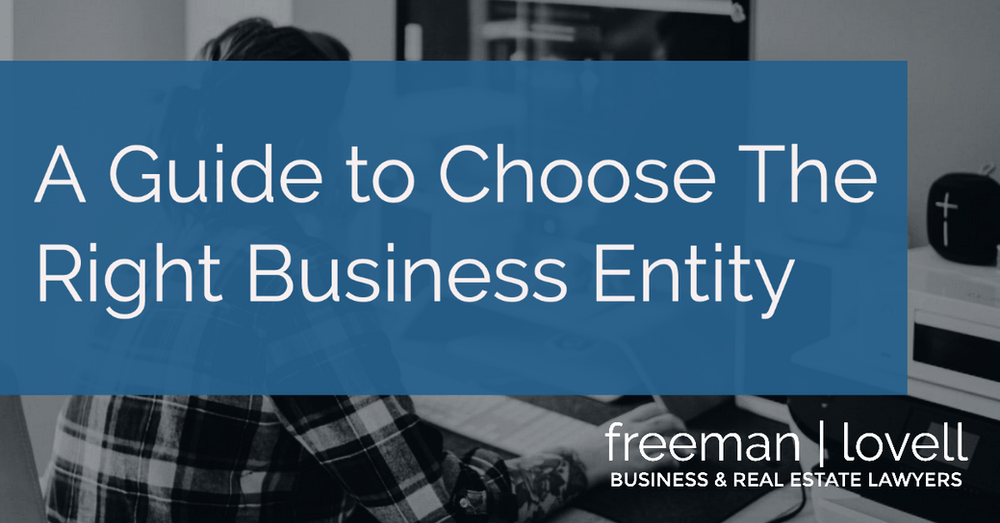Entrepreneurs like you drive progress in your part of the world every day. You take risks and need to adjust quickly, yet one wrong step, legally, can cripple all you are working so hard for. In this article, we want to guide you through one of the most important decisions as an entrepreneur, finding the right business entity type for your business.

Turning an idea into a successful business is exhilarating. But it means making some crucial decisions right from the start. We’re on your side to help you identify and avoid common legal mistakes so you can continue turning your vision into reality. In fact, the very first decision that you will have to make is selecting the type of business entity that fits your company. This decision will have significant financial and legal implications for your business, and that is why you should talk to a business lawyer and tax attorney before you make a final decision.
The type of business entity you choose will determine the amount of taxes you will end up paying in the future. It also influences your ability to raise funding from outside investors or get a small business loan. In addition to this, your business entity type is the one that determines your personal exposure you might face if someone sues your business.
There are over a dozen business entity types in the USA including, sole-proprietorship, partnership, non-profit, corporation, limited liability company, and so on. But the most common entity types are:
● Limited Liability Company (LLC)
● C-corporation
● S-corporation
With so many options, how do you know which is best for your business? That is what we will discuss in the next section.
Note: Do remember that you will still need the advice of a corporate lawyer and a tax attorney to guide you. At the end of the day, they are the ones who know the laws best in your area and can help you make the right choice.
Types of Business Entities
Limited Liability Company (LLC)
A Limited Liability Company is a “One Size Fits Most” kind of business entity. An LLC is a popular choice for most small business owners. It is a highly flexible kind of business, meaning that it can be managed in a number of ways. An LLC, which is short for the Limited Liability Company, offers limited liability protection to the owners for business debts and obligations.
Here are some reasons why an LLC makes a great option for a small business:
● An LLC has very few on-going requirements and paperwork as compared to the C-corps and S-corps.
● It offers liability protection to the owners for business debts and obligations. This means that the owners’ personal assets are not at risk and cannot be used to pay off business debts or any other legal liabilities.
● The IRS allows an LLC to choose the way they want their entity to be taxed. So, you can elect to be taxed as a C-corporation, where you will have to pay the taxes both on the corporate level and the personal level. Or, you can elect to be treated as a pass-through entity, where all your taxes are paid on a personal level and eliminate the possibility of being taxed twice.
● The owner of the LLC does not need to be a U.S. citizen or be a permanent resident in the USA. Anyone can form an LLC, but there are other legal requirements that a corporate lawyer can help you with.
● An LLC also offers enhanced credibility where lenders, suppliers, and partners may favor it more as compared to the other business entities.
Despite all the advantages, an LLC is not perfect. One of the drawbacks of the LLC is that the owner will have to pay the self-employment tax along with the personal income tax on profits earned. This makes the overall tax payment more than you might expect.
An LLC would be the best choice for you if:
● You want a flexible management structure for your company.
● Your startup has losses in the initial years and you want to be able to pass-through these losses to you and your partners.
● You want your business to own real estate.
● You want to use flexible accounting methods. LLC does not have to use the accrual method of accounting like some C-corps have to.
● You want flexibility in sharing profits among the owners.
● You do not want to have many on-going formalities and documentation requirements.
If the above is what you are looking for, then an LLC is a great choice. Just remember to get advice from a business lawyer and a tax attorney when making your choice to be sure that it is the right fit for your business idea.
C-Corporation
A C-corporation is a business entity that tends to have higher risk and higher costs to maintain, and offers potentially higher rewards as compared to the LLC. Considered independent legal entities, C-corporations have a higher separation from their owners. In this entity type, the officers, board of directors, and shareholders (who are the equity owners) control the company. However, all these roles can be taken care of by one person. So, if you create a C-corp, you can be in charge of everything, if you want.
Here are the reasons why a C-corporation makes a great option for your business:
● Just like an LLC, owners do not have personal liability for the liabilities and debts of the business.
● You will have the choice to offer stock options in exchange for funding to grow your company, unlike an LLC.
● The owners of a C-corp pay much lower self-employment taxes as compared to what the LLC owners pay.
● C-corps may be eligible to get a lot of tax deductions compared to business entity types.
But a C-corp does not have it all. There are a lot of tax laws and regulations that the C-corporation has to comply with. A C-corp has to follow various formalities like creating bylaws, holding annual shareholder and board meetings, and recording the minutes of meetings. Moreover, the process to start a C-corporation also includes a lot of paperwork and each state has its own laws for it. A corporate lawyer can help you with this.
Additionally, C-corporations face double taxation where the company pays tax on the income made (as part of the corporate tax return), and then the shareholders pay taxes on the dividends they receive (as part of their personal tax returns). The owners cannot deduct any losses the business might have on their personal income tax, as all the deductions are made on the corporate level tax payment. One way to avoid double taxation is if the owners invest their profits back into the company.
A C-corporation would be the best choice for you if:
● You want to grow your company into an empire and need institutional or venture capital funding.
● You want to be able to offer stock options to employees in your company so that they stick around longer and increase the productivity and revenue of the company.
● You want to be able to sell your business easily when you are done with it.
● You want the flexibility to set salaries for owners and employees to minimize Social Security and Medicare taxes.
● You want the flexibility to spread the earnings of the company among the shareholders and corporation for tax-planning purposes.
● You want company earnings to stay in your business so that it can grow.
● You want to lower your risk to the exposure of getting an IRS audit. An audit rate is higher for the business whose income is reported on the Schedule C of Form 1040, the Individual Income Tax Return form.
● You want to have an IPO ultimately or a large exit.
In short, C-corps can be a great choice for those who want to grow their company. It also helps you with a lot of legal protections that no other business types offer.
S-Corporation
The S-corporation is a “Proceed With Caution” kind of entity. It has limited liability protection just like the C-corp but the tax is paid at a personal level as it is a pass-through entity. This means that the shareholders will have to pay the tax on the profits they make on their personal income tax returns. To own an S-corporation, you will have to first form a corporation or an LLC and then elect to have it taxed as an S-corp using the IRS form 2553.
Here are the reasons why an S-corporation makes a great option for your business:
● The shareholders, who are the owners of the company, are not personally liable for the liabilities and debts of the business.
● There is no double taxation issue here as the S-corp is a pass-through entity like an LLC.
● There are also employment tax savings that you can take advantage of.
● If structured well, it can help you make the right amount of money and be successful in your business.
But there are a lot of negative points as well. With some limited exceptions, an S-corp cannot be owned by an entity, trust, or another corporation, unlike the C-corp of LLC that can be owned by anyone. All owners also have to be U.S. citizens. The S-corp has a limit issuing stocks, where it can have only one type of financial stock in the company.
It also has a limit on the number of shareholders that the company can have, 100. Additionally Restructuring an S-corp is highly challenging and tough. It is tough to move assets in and out of the company, especially if the assets keep increasing or decreasing in value. So, if you have an S-corp and want to convert it into another business entity, it could be very expensive in taxes and/or legal and professional fees. If you are looking to restructure an S-Corp, make sure to discuss carefully with a business lawyer and tax attorney.
An S-corporation would be the best choice for you if:
● You want flexibility in selecting your choice of accounting methods.
● You want the flexibility to set the employees’ or owners’ salaries to minimize social security and Medicare taxes.
● You want to take advantage of pass-through taxation and savings on self-employment taxes.
In short, an S-corporation is very inflexible. With all its positive and negative points, it is the perfect fit for businesses like the pure service business, and professional practitioners. So, before you choose to select this business type, ensure that you contact your tax attorney and corporate lawyer to see if it is the right choice for you or not.
The Bottom Line
In the end, it is very important for you to choose the business entity that is right for you. Keep in mind how it will affect your business, finances, and legal exposure. And while you choose your business entity, make sure that your tax attorney and your corporate lawyer agree with your choice.
As entrepreneur lawyers, we appreciate your path as a business owner. We love working with bold visionaries like you that navigate your industry with purpose. That is why we are here, to help you navigate hidden legal risks so that you can focus on your business.
For any queries and doubts that you have, talk to your business lawyer and tax attorney. In fact, we offer these services and can help you. So, if you need help with choosing your business’s type and starting your business, Freeman Lovell can help you. Feel free to reach out to me at josh@freemanlovell.com or click on the button at the top right to contact us to learn more!




